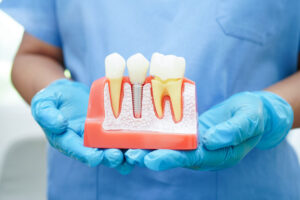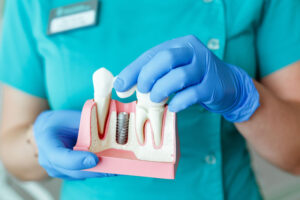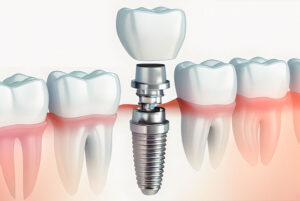Teeth implants are a revolutionary solution for those who have lost teeth, providing a long-term, durable, and natural-looking replacement. However, like any medical procedure, they are not without potential issues. Understanding how dental implants work and recognizing when something goes wrong is essential to ensuring successful outcomes. In this blog, we’ll explore the common problems with teeth implants, how to identify them, and what to do if they occur. By familiarizing yourself with potential issues and their solutions, you’ll be better prepared to address concerns early and maintain the health of your dental implants.
Understanding Teeth Implants: Basics and Common Issues
Dental implants are artificial tooth roots placed into the jawbone to support a replacement tooth, crown, or bridge. They are often made of titanium, a material known for its strength and ability to integrate with the bone through a process called osseointegration. This integration allows the implant to function as a permanent replacement, helping to restore both the form and function of missing teeth. Despite their high success rates, dental implants may experience issues, especially if proper care is not taken during the healing and maintenance phases.
Common problems with teeth implants can arise at various stages of the implant process. These include infection, gum irritation, or issues with osseointegration. An implant may fail to integrate with the bone, or it might become loose or shift over time. Additionally, complications can occur due to poor planning during the initial consultation or challenges during surgery. Understanding the basics of implant procedures helps you recognize these common problems early, ensuring that timely action is taken to avoid further complications.
Recognizing Implant Problems: Warning Signs and Symptoms
It’s crucial to be able to identify when something is wrong with your dental implants so that corrective measures can be taken promptly. The most common sign that an implant may be problematic is discomfort or pain that persists for longer than expected. After the initial recovery period, minor soreness can be expected, but constant pain or swelling could be a red flag. If the implant area feels loose or if the prosthetic tooth becomes wobbly, this could indicate a failure of the implant or a problem with the connection to the surrounding bone.
Other warning signs include redness, tenderness, or discharge around the implant site, which may suggest an infection. You may also notice an unusual metallic taste in your mouth, indicating that the implant itself is being affected by corrosion or another issue. It is essential to watch for changes in how your implant feels or functions. If these symptoms persist, it’s a strong indication that you should seek professional attention from your dentist to determine the cause and get appropriate treatment.
Exploring Causes Behind Implant Complications
Several factors can contribute to the problems that arise with dental implants. One of the primary causes is bone loss, which can prevent the implant from successfully integrating with the jawbone. This can occur if a patient has insufficient bone density or if bone loss continues post-surgery. Additionally, poor oral hygiene is another significant cause of implant complications. Bacteria buildup around the implant site can lead to infections and gum disease, which can interfere with the healing process or even cause the implant to fail.
Complications can also arise due to errors during the surgical procedure. If the implant is not placed correctly or if there are complications during the healing process, the implant may fail to integrate properly. Factors such as smoking, certain medications, and pre-existing medical conditions can also increase the risk of implant failure. Understanding these potential causes helps patients take proactive steps to prevent issues and protect the long-term success of their implants.
Preventive Measures and Best Practices for Implant Care
The best way to prevent problems with teeth implants is through regular care and maintenance. Oral hygiene plays a critical role in ensuring that your implant remains healthy and functional. Brushing and flossing daily are essential to prevent plaque buildup, which can lead to infection or gum disease around the implant site. Additionally, regular visits to the dentist for checkups and professional cleanings are necessary to monitor the health of the implant and surrounding gums.
Lifestyle choices, such as quitting smoking and managing medical conditions like diabetes, can also significantly reduce the risk of implant complications. Using a night guard to protect your implants from teeth grinding can further enhance their longevity. It’s important to follow your dentist’s advice on any post-surgery care, including avoiding hard or sticky foods during the healing process. By adopting a consistent maintenance routine and taking these precautions, you can enjoy the long-term benefits of your implants and avoid costly complications down the line.
Effective Treatment Options for Implant Complications
If issues do arise with your dental implants, there are several treatment options available. In some cases, conservative methods such as antibiotics or adjustments to the prosthetic may be enough to resolve the problem. However, more severe cases may require surgical intervention. For example, if an implant has failed to integrate with the bone, a revision procedure may be necessary to place a new implant in the correct position.
In instances of infection or gum disease, a professional cleaning or flap surgery may be performed to remove any infected tissue and allow the implant to heal properly. In rare cases, the entire implant may need to be removed and replaced. Your dentist will work with you to determine the most appropriate course of action, taking into account your specific situation and the extent of the problem. It’s essential to address any implant concerns promptly to ensure the best possible outcome.
When to Seek Professional Guidance for Implant Concerns
If you experience any discomfort, swelling, or unusual symptoms around your dental implant, it’s important not to ignore them. Even minor issues should be addressed by a dental professional as soon as possible to prevent further complications. Waiting too long can allow problems to worsen, making treatment more complex and costly. If your implant feels loose or you notice changes in how it functions, schedule an appointment with your dentist for a thorough evaluation.
Don’t wait for symptoms to escalate. Seeking professional care early can prevent the need for more invasive treatments down the road. By staying vigilant and scheduling regular checkups, you can ensure that your dental implants remain in good health for many years.
About Dr. Harroz and Dentistry by Design
Dr. Harroz, Edward, is a highly skilled general practitioner with extensive experience in managing and resolving problems with dental implants. With his expertise and commitment to patient care, Dr. Harroz offers comprehensive evaluations and personalized treatment plans for every patient. Whether you’re experiencing implant issues or considering dental implants for the first time, Dr. Harroz provides the highest level of care and ensures that each patient receives the attention they deserve.
At Dentistry By Design, we pride ourselves on offering exceptional care in a comfortable and supportive environment. Dr. Harroz uses the latest technology and techniques to provide the best possible outcomes for patients, addressing both preventive and corrective treatments for dental implants. With his guidance, you can trust that your dental health is in capable hands.
Schedule an Appointment with Dr. Harroz Today
Are you experiencing issues with your dental implants? Don’t wait to address potential concerns. Contact Dr. Harroz at Dentistry By Design to schedule an appointment and receive expert evaluation and care. Our team is ready to help you maintain the health and longevity of your implants. Reach out today for a consultation, and take the next step toward a confident, healthy smile!






